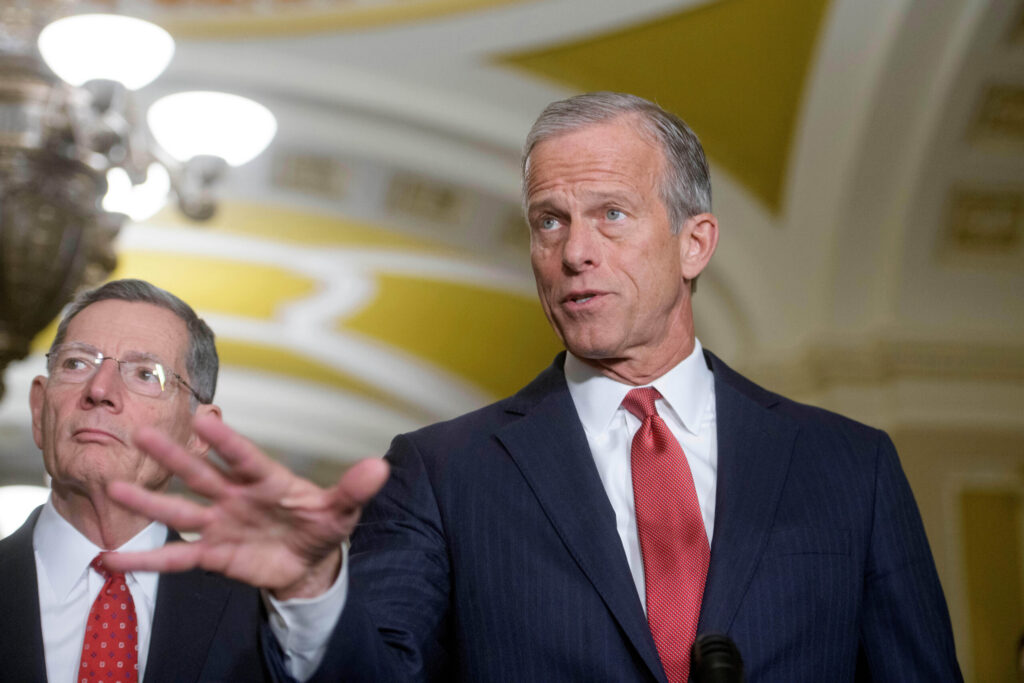Republicans advance measure to repeal Colorado health insurance exchange
A Republican senator pushing a repeal of the state’s health insurance exchange implored Tuesday that his bill is “not an attempt to indict former President Obama.”
But that didn’t stop throngs of opponents who conflated the issue with possible actions by a Republican-controlled Congress and by President Trump to repeal the Affordable Care Act.
“There is a tremendous amount of emotion around this topic,” explained Sen. Jim Smallwood, R-Parker, the sponsor of the exchange repeal.
The Senate Finance Committee advanced Senate Bill 3 Tuesday after the measure’s first committee hearing on a 3-2 party-line vote. The bill faces an uphill battle if it makes it to the Democrat-controlled House.
After the vote, some in attendance chanted, “Shame! Shame!”
Outside the Capitol, a “Save My Care” bus tour – organized by ProgressNow Colorado, the Colorado Health Initiative and Healthier Colorado – held a news conference ahead of the hearing, in which critics said the state repeal measure would take health care away from tens of thousands of Coloradans.
Republicans have grown increasingly frustrated that left-leaning groups are working to convince supporters that the Colorado effort is in line with proposals in Congress.
“Senate Bill 3 does not repeal the Affordable Care Act …. It does not cancel anyone’s insurance policies …. It does not change anyone’s insurance policies …. It does not end federal subsidies … It does not change any of the rules around health insurance …. It does not roll back any sort of Medicaid expansion,” said Smallwood, who has a background in insurance brokerage.
“Connect for Health is extremely and unnecessarily expensive to the Colorado taxpayer …. Secondly, Connect for Health has not proven to be successful.”
The state’s insurance exchange was established in 2011 with bipartisan support in an effort to allow Colorado to carve its own path in light of the Affordable Care Act. But it was always overshadowed by political wrangling connected to the federal law.
Under Smallwood’s proposal, the exchange would be repealed on Jan. 1, 2018, though it would be allowed to continue for one year after. Any leftover money would be transferred to the general fund for discretionary spending.
The measure would save $5 million per year beginning in the 2018-19 fiscal year, with that money being diverted to the general fund for discretionary spending.
Critics of the bill – many who spoke of how the exchange provided them with options – acknowledged problems with health care in America, including rising costs and a lack of access. But they said a repeal of the exchange would do nothing to address those issues.
Opponents said without the state exchange they would be forced to use healthcare.gov, which is facing an uncertain future.
“For me, this is a life-saver, both in terms of happiness for my life and actually keeping ticking,” said Jacki Marsh, a Loveland woman who was the winner of the world’s first women’s-only distance race in 1972 before she had to rely on a pacemaker to survive because of a heart condition.
“I do not want to put my life in the hands of a narcissistic sociopath who’s presently sitting in the Oval Office. I do not trust him with my life and I ask that you do not trust him with my life.”
More than 175,000Coloradans selected health care coverage for 2017 through the state health exchange during the three-month open enrollment period that ended Friday, a rate 12 percent ahead of signups one year ago, according to data released Monday.
“Now as we face an uncertain future of health care reform, we feel that our platform and the stakeholder engagement that has helped create us continues to make us better and can be the springboard to innovative options for the future,” said Kevin Patterson, chief executive of Connect for Health Colorado.
He added that the model could be used for such things as a regional exchange for Western states.
But some consumers spoke Tuesday of excruciating experiences with the exchange, including hours of time spent online, only to have their information deleted and told to start over.
Connect for Health has also faced unflattering audits, in which problems with dozens of payments and reimbursements were exposed.
Still, Senate Democratic Leader Lucia Guzman of Denver said it allows Colorado to chart its own course. She accused Republicans of abandoning principles around local control.
“My experience with your party is that you have always been strong on state’s rights … and here you are wanting to take away this program and move it to the feds.”











